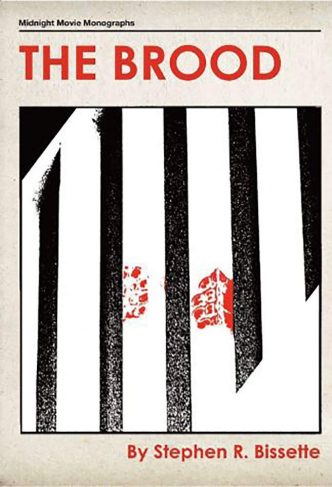By STEPHEN R. BISSETTE (PS Publishing; 2020)
An unquestionable landmark in the field of genre studies, this hefty “forensic and holistic” study of David Cronenberg’s THE BROOD is, quite simply, the most thorough and wide-ranging textual analysis of a horror movie ever written. Indeed, it may well be the most in-depth movie monograph of any sort, handily outdoing the previous contenders (which include Paul Buck’s PERFORMANCE: A BIOGRAPHY OF A 60s MASTERPIECE and Joseph Lanza’s TEXAS CHAINSAW MASSACRE: THE FILM THAT TERRFIED A NATION) in insight, erudition and sheer obsessiveness. Penned by the famed comic book artist, editor and film commentator Stephen R. Bissette, this book was published as part of PS Publishing’s Midnight Movie Monograph series, whose editor Neil Snowdon is to be commended for not paring this 662 page monster of a book down to “manageable” size, as Bissette is a rare author who works best in large doses.
Readers familiar with Bissette’s past writings on film, contained in Deep Red, Gorezone, Weng’s Chop and elsewhere, will know what to expect. As he did in those publications, Bissette writes in erudite but non-academic prose (with a welcome absence of words like “modernist” and “formalism”), and utilizes a number of stylistic quirks (such as his habit of identifying films by their director and screenwriters).
THE BROOD, released in 1979, was the depraved account of a man (Art Hindle) discovering that his estranged wife (Samantha Eggar) is creating a brood of inhuman childlike creatures who enact her darkest impulses. It was Cronenberg’s fourth feature, and apparently his “first masterpiece.” I don’t agree with that assessment, but can’t deny that Bissette makes a persuasive case for THE BROOD’S greatness (even if it seems to me that the film described here is closer to what Cronenberg wanted to make than what resulted). Bissette fully admits that his reverence is based in large part on personal experience, with elements of his own life intersecting with those of the film, resulting in a book that functions as an autobiographical reverie in addition to an analysis of THE BROOD, its maker’s filmography and the cinematic landscape “B.C. and A.C.” (Before Cronenberg/After Cronenberg).
THE BROOD’s creation and reception are explored at great length in these pages, which can literally be said to leave no BROOD-related stone unturned. This entails a wealth of lengthy, footnote packed digressions; as Bissette warns early on, “This text may wander afield at times, but stay with me: it always comes back to THE BROOD, with a purpose.” Bissette’s multimedia wanderings touch on everything from DR. FRANKENSTEIN ON CAMPUS (1970), the books of Carlos Castaneda, “parasitological” literature, LITTLE AURORE’S TRAGEDY (1952), the Canadian film censorship board, Andrzej Zulawski’s POSSESSION (1981), the TOMIE manga, the articles written by Cronenberg’s science fiction buff father Milton and much more, all pulled off with astounding knowledge and insight*.
It can be argued that Bissette’s digressions actually constitute the meat of the book. If nothing else, they help get the reader through some of the less invigorating passages. An example of the latter would be a lengthy section in which Bissette attempts to refute an assertion by the late critic Robin Wood that THE BROOD is misogynistic; a great deal of ink is expended but Bissette doesn’t get very far in his counter-argument (Wood hated Cronenberg’s films on principle, so arguing with his critiques seems a mite pointless). Another issue is with the question of whether Cronenberg filmed in the apartment where he was living at the time, a query Bissette seems to find endlessly fascinating but which I strongly doubt will interest too many of his readers.
Also included are interviews with the film’s star Art Hindle, his onscreen daughter Cindy Hinds, novelist Graham Masterton (whose bestseller THE MANITOU bears a more-than-passing resemblance to THE BROOD) and cinematographer Mark Irwin. Conspicuously absent from the line-up is David Cronenberg, who Bissette admits in the acknowledgements page will “most likely never read this book.” I hope Mr. Cronenberg reverses that stance, as I believe he’ll appreciate Bissette’s thoroughness and erudition. I certainly did.
*Sorry to be a spoilsport, but I feel duty-bound to point out a couple minor but glaring errors. The first occurs in the section on DR. FRANKENSTEIN ON CAMPUS, where Bissette credits one of the lead roles to “Dave Brower;” the role was actually played by Ty Haller, who went on to co-script the Cronenberg-directed 1976 PEEPSHOW episode “The Victim” (which is mentioned later in the book). The second error is in Bissette’s comments about TOMIE, of which “there is nothing in Western horror literature, cinema and comics quite like it”—for my response see here.

